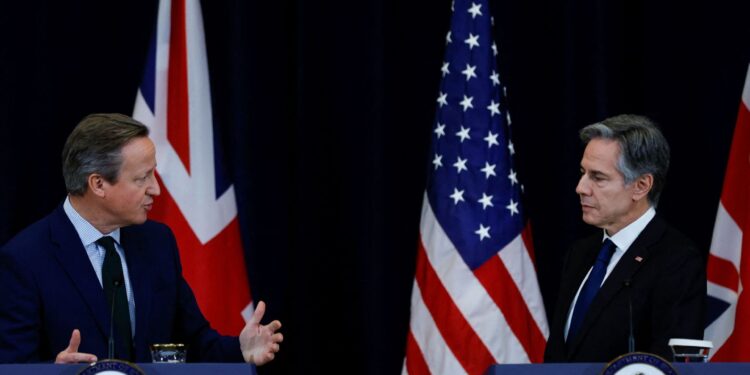Reuters quoted a White House official as saying that the US administration did not give a specific deadline for Israel to end major combat operations in the Gaza Strip. US President Joe Biden, in contact with Israeli Prime Minister Benjamin Netanyahu, called for the establishment of what he described as humanitarian corridors “to separate the civilian population from the Hamas movement.” While US Secretary of State Anthony Blinken stressed the need to work to protect civilians in Gaza and bring in aid.
John Feiner, National Security Assistant at the White House, added during a security forum that if the war stopped today, Hamas would continue to pose a threat to Israel, and that is why Washington is not asking Israel to stop, as he put it. The White House official indicated that Washington believes that there are many legitimate military targets that still exist in southern Gaza.
The Wall Street Journal quoted American officials as saying that Secretary of State Anthony Blinken informed the Israeli war cabinet last week that the American government believed that the conflict should end within weeks, not months. But the newspaper explained that Israeli officials did not provide any guarantees to end the war within weeks.
For his part, the US Secretary of State said that there is still a gap between what he called Israel’s intention to protect civilians and the actual results on the ground in Gaza. Blinken indicated in a joint press conference in Washington following his meeting with his British counterpart, David Cameron, that Washington is aware of what he described as the exceptional difficulty facing the task of protecting civilians, but Israel must commit to that.
Blinken reiterated Washington’s position of rejecting the reoccupation of Gaza and rejecting the forced displacement of its people or reducing the area of the Strip.
For his part, the British Foreign Minister said that he discussed with his American counterpart how to revitalize the Palestinian Authority and develop a plan to chart a safe future for both Israel and the Palestinian people after the end of the war, he said.
He added, “We must begin not only to provide the necessary assistance to the people of Gaza, perhaps using sea routes as well as land routes if necessary, but also to think about the future after the end of this military operation.”
Safe passages without a truce
In a call with the Israeli Prime Minister yesterday, Thursday, the US President stressed the “urgent need” to protect civilians as fighting intensifies in the major cities of Gaza and its environs, according to what the White House announced.
In his first phone call with Netanyahu since November 26, Biden called for “separating the civilian population from Hamas, including through corridors that allow people to move safely from specific areas of hostilities,” as he put it.
In turn, Robert Wood, the US Deputy Representative to the Security Council, said that the United States is working on what he described as ensuring that Israel’s approach is modified in order to carry out more precise attacks on Hamas facilities and its leadership. He added that modifying Israel’s approach to its attacks on civilians will take some time.
For his part, White House Strategic Communications Coordinator John Kirby said that talks are continuing regarding the situation in Gaza, but there is no approach to reaching a new humanitarian truce in the Strip.
He added, “Talks and discussions are still continuing around the clock, and our teams are in contact with the parties and partners, but I do not have any information regarding any progress made on the issue of the truce, and we are not close to approving a new humanitarian truce in Gaza, and I also do not have any information regarding the exchange of “The detainees, whether they are Americans or of other nationalities, are trying to obtain as much information as possible about the status of the detainees.”
With Qatari mediation and support from Egypt and the United States, Israel and the Hamas movement reached a truce that began last November 24 for 4 days and was extended until it reached 7 days, during which dozens of Israeli civilian detainees, including women and children, were exchanged in Gaza in exchange for the release of three times as many Palestinian male and female prisoners. children.
The Israeli occupation army is waging a devastating war on the Gaza Strip, which has entered its third month, leaving more than 17,000 martyrs and more than 46,000 wounded, in addition to massive destruction of infrastructure and an “unprecedented humanitarian catastrophe,” according to official Palestinian and UN sources.



